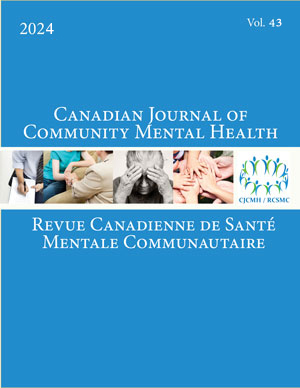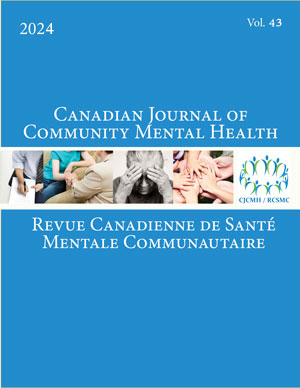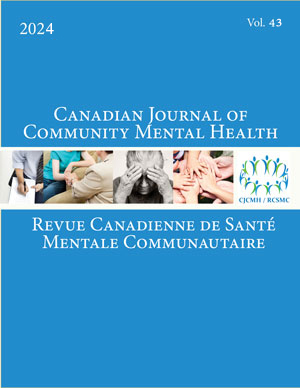Volume 40 • Number 2 • July 2021
Articles
OPEN ACCESS
The objective of this pilot study was to assess the effects of the indicated level of a multilevel preventive program on depressive symptoms and to examine personal goals appraisal as a moderating factor among college students aged between 16 and 29 years old with depressive symptoms. Students were screened for anxious and depressive symptoms in the beginning of their semester. Those who scored higher than the cut-off score were invited to be part of the intervention group. A comparison group was formed with students who did not wish to participate with the intervention group. Thirty-six students were included in the analyses. Both groups completed pre-test, post-test, and follow-up questionnaires. Results indicated a reduction in depressive symptoms at post-test and these gains were maintained three months later. Students in the intervention group with a more positive appraisal of their academic and career goals showed fewer depressive symptoms than students in the intervention group with a less positive appraisal of these goals. Limitations and implications for further implementation are discussed.
OPEN ACCESS
It is unclear how ethno-cultural concentration of residential areas relates to the mental health of immigrant, refugee, ethno-cultural, and racialized (IRER) groups. Communities of higher ethno-cultural density are theorized to support IRER groups’ mental health via community supports, access to culturally/linguistically appropriate healthcare, and lower discrimination/stigma. This article reviewed quantitative studies that examined relationships between communities’ ethno-cultural density and mental health among IRER groups in Canada. Eleven of the sixteen reviewed studies (almost 70%) observed protective associations between ethno-cultural density and mental health; patterns were more mixed for studies with child populations, suggesting associations may differ based on developmental phases. Findings suggested there was more support in protective associations of higher areal ethno-cultural density with regard to community mental health of IRER groups in Canada.
OPEN ACCESS
While there is growing recognition that fathers lack social support during the transition to fatherhood, little is known about the types of services fathers would access. An online survey was conducted with Canadian fathers asking about the type and helpfulness of support they sought. Participants also rated their interest in, convenience of, and the likelihood of using alternative options. All fathers sought support and the majority relied on partners, friends, and family. Fathers were equally likely to have accessed online support versus support from professionals. While fathers rated face-to-face interactions as potentially helpful, they rated online sources as most convenient.
OPEN ACCESS
This article explores the victimizing experiences of individuals with mental illness using grounded inductive qualitative research methods, by extracting themes from 15 first-hand accounts of living with mental illness delivered on the TED Talks media platform. Emergent themes included (1) victimizing effects of the illness including the effects of medication and the effects of stigma, (2) normalcy, (3) the importance of help-seeking in the process of overcoming obstacles presented by mental health issues, and (4) victimization by others. We conclude that the speakers in our sample, even though they reflect an extraordinary level of functioning, still view themselves as what Becker (1991 [1963]) describes as outsiders, acting as moral entrepreneurs, crusading to normalize madness through a variety of strategies.
OPEN ACCESS
There is limited literature on youths’ experiences of accessing mental health supports and services in rural Canada. Through interviews with young women, this research explored barriers and facilitators to accessing mental health services and supports in rural Nova Scotia. Participants shared numerous barriers at the family, school, and community levels, including stigma from family, lack of knowledge of school supports, and limited community service options. Facilitators also existed at these three levels, including supportive parents, school-based service availability, and supportive community members. Increased investment in school-based services may improve access; however, an understanding of young men’s experiences is needed first.
OPEN ACCESS
Ce projet est issu d’une préoccupation quant au besoin de développer des outils de communication faciles à comprendre et qui répondent au plus grand nombre de parents d’enfant(s) autiste(s) ayant récemment reçu leur diagnostic. Dans une approche systémique de la littératie en santé (Sørenson et al., 2012), nous avons développé une grille pratique de manière à soutenir la rédaction de documents et leur amélioration afin de les rendre plus compréhensibles pour le grand public. La démarche réalisée s’est caractérisée par le croisement des perspectives de différents publics concernés : professionnels, parents, adultes autistes. Ce projet novateur est l’un des premiers à avoir exploré les enjeux de littératie dans le contexte de l’autisme.
Practice Innovations
OPEN ACCESS
This article outlines findings from two Wellness Recovery Action Plan® workshops for college students in Western Canada. Widely recognized mental health challenges among college students and a service need demonstrated in pilot sessions served as rationale for providing one of the first iterations of WRAP in a college setting.
OPEN ACCESS
Up to 15% of mothers experience postpartum depression (PPD) symptoms. Using a pre—post design, results from two 8-week psychoeducational group programs for mothers with moderate levels of PPD symptoms are presented. Findings show the low-cost program to be a promising secondary preventative intervention for an undertreated population.










